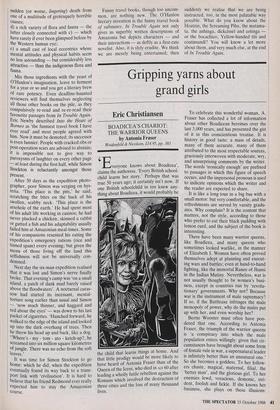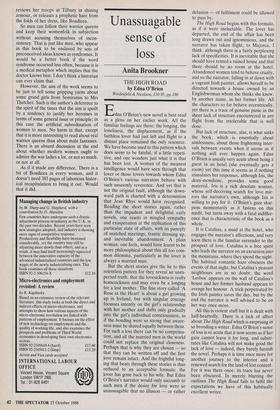Gripping yarns about grand girls
Eric Christiansen
BOADICEA'S CHARIOT: THE WARRIOR QUEENS by Antonia Fraser
Weidenfeld & Nicolson, £14.95, pp. 383
Everyone knows about Boadicea', claims the authoress. 'Every British school- child learns her story.' Perhaps that was true 50 years ago; it certainly isn't now. If one British schoolchild in ten knew any- thing about Boadicea, it would probably be the child that learns things at home. And that little prodigy would be more likely to have heard of Antonia Fraser than of the Queen of the Iceni, who died in AD 60 after leading a wholly futile rebellion against the Romans which involved the destruction of three cities and the loss of many thousand lives. To celebrate this wonderful woman, A. Fraser has collected a lot of information about other Boadicean heroines over the last 3,000 years, and has presented the gist of it in this conscientious treatise. It is history in good taste: a mass of details, many of them accurate, many of them attributed to the most respectable sources, graciously interwoven with moderate, wry, and unsurprising comments by the writer. The words 'ironically enough' are prefixed to passages in which this figure of speech occurs, and the impersonal pronoun is used to indicate opinions which the writer and the reader are expected to share.
It is like a long tour in a big bus with a small motor: but very comfortable, and the refreshments are served by varsity gradu- ates. Why complain? It is the content that matters, not the style, according to those who prefer to eat their black pudding with lemon curd, and the subject of the book is interesting.
There have been many warrior queens, like Boadicea, and many queens who sometimes looked warlike, in the manner of Elizabeth I. Women have often proved themselves adept at planning and execut- ing wars and battles; even at hand-to-hand fighting, like the immortal Ranee of Jhansi in the Indian Mutiny. Nevertheless, war is not usually thought to be women's busi- ness, except in countries run by 'revolu- tionary' governments. Why not? Because war is the instrument of male supremacy? If so, if the Battleaxe infringes the male monopoly of power, why do the males put up with her, and even worship her?
Bertie Wooster must often have pon- dered that one. According to Antonia Fraser, the triumph of the warrior queens is 'a conspiracy into which the male population enters willingly: given that cir- cumstances have brought about some form of female rule in war, a supernatural leader is infinitely better than an unnatural one.' So she becomes a goddess. To her follow- ers chaste, magical, maternal, filial, the `better man', and the glorious girl. To her enemies lewd, voracious, demonic, stri- dent, foolish and fickle. If she knows her business, she plays on these illusions: reviews her troops at Tilbury in shining armour, or releases a prophetic hare from the folds of her dress, like Boadicea.
So men can follow their warrior queens and keep their womenfolk in subjection without accusing themselves of incon- sistency. That is just like men, who appear in this book to be enslaved by sets of preconceived ideas known as syndromes. It would be a better book if the word syndrome occurred less often, because it is a medical metaphor which implies that the doctor knows best. I don't think a historian can ever claim that.
However, the aim of the work seems to be just to tell some gripping yarns about some grand girls from Semiramis to Mrs Thatcher. Such is the author's deference to the spirit of the times that the aim is spoilt by a tendency to justify her heroines in terms of some general issue or principle; in this case the artificial subordination of women to men. No harm in that, except that it is more interesting to read about real warrior queens than about male fantasies. There is an absurd discussion at the end about whether modern women ought to admire the war ladies a lot, or not so much, or not at all.
As if it made any difference. There is a bit of Boadicea in every woman, and it doesn't need 383 pages of laborious histor- ical recapitulation to bring it out. Would that it did.



























































 Previous page
Previous page